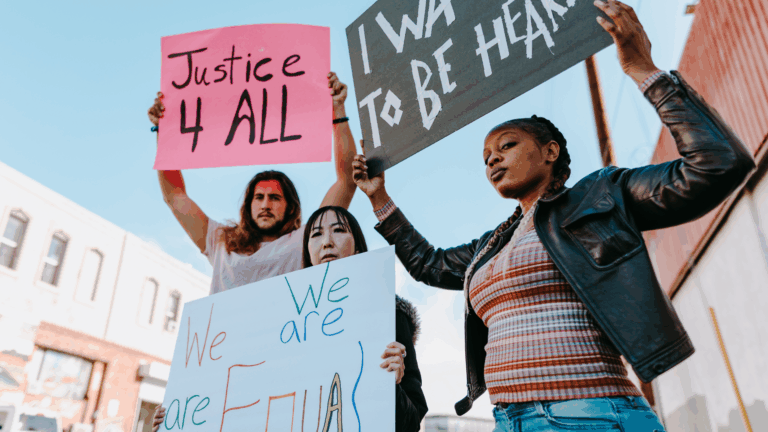This season, we’re helping pastors and parents grasp a vision for a Church where God’s wisdom is more than just true for LGBT+ people but also leads to undeniably good and beautiful thriving. Explore this blueprint for a Church where LGBT+ people flourish according to historic sexual ethics, including a recording from Asbury Theological Seminary. Then go to equipyourcommunity.org/morethantrue to read the stories of communities leading the way and give to help more churches offer LGBT+ people something more than just true.
A mom of a gay teen recently reached out to me. She shared that, as a child, her son seemed to glow with a love for life. He was always eager to read his Bible and lead the family in prayer before dinner and contribute during Sunday school.
Then he went through puberty, and the golden glow dimmed. Finally, the light went out.
By the time the teen shared with his mom that he was attracted to other guys, he was teetering between whether God is cruel or whether the Bible is a joke. Or whether God is real at all.
The mom was desperate.
So we hopped on the phone, and at one point she tearfully asked, “I think I know what’s true about all this LGBT+ stuff. But is God’s wisdom good for my child? Will it be beautiful? I’m his momma. At the end of the day, I just want my boy to be happy. I can’t stand the idea of him living some tortured life. Like, if he actually chose to follow the Bible, would the golden glow come back? Would he live an amazing, joyous life full of love? Or to obey God, do I have to make peace with the fact that my kid’s life is just going to be a lot of cross-bearing? Do I have to accept that, at best, my baby is staring down a lifetime of miserably tragic faithfulness?”
Unfortunately, this conversation is all too common. Every week, Equip receives emails and direct messages on social media from parents and loved ones of LGBT+ people. These parents, siblings, and friends have noticed that what’s true doesn’t seem to be leading to good and beautiful in the lives of the LGBT+ people they know.
Has this been your story? Your family’s story? Your church’s story?
We’ve got queer siblings, children, and friends who’ve tried mightily to steward their sexualities according to God’s wisdom but have suffered mightily in the process. Instead of thriving according to historic Christian sexual ethics, obedience to Christ’s truth has too often led to loneliness, depression, loss of faith, or loss of life for the LGBT+ people we love. They tried harder than anyone else we know to make Jesus happy, but the pain of their striving seemed to leave Jesus feeling further and further away.
Something doesn’t fit.
What’s true should lead to good and beautiful
Perhaps the answer is in Philippians 4:4-9:
Rejoice in the Lord always. I will say it again: Rejoice! Let your gentleness be evident to all. The Lord is near. Do not be anxious about anything, but in every situation, by prayer and petition, with thanksgiving, present your requests to God. And the peace of God, which transcends all understanding, will guard your hearts and your minds in Christ Jesus.
Finally, brothers and sisters, whatever is true, whatever is noble, whatever is right, whatever is pure, whatever is lovely, whatever is admirable—if anything is excellent or praiseworthy—think about such things. Whatever you have learned or received or heard from me, or seen in me—put it into practice. And the God of peace will be with you.
Paul seems to be getting at the fact that what’s true, what’s honorable, what’s just, what’s pure, what’s pleasing, and what’s commendable are supposed to go together. St. Thomas Aquinas, among others, have commented on how Christians have an inherent sense that what’s true should also be good and beautiful.
So when it comes to sexual ethics, it’s not good enough for historic Christian sexual ethics to be (just) true. If they’re really true, they must lead to good and beautiful things in the lives of gay Christians who follow them. So how do we make that a reality?
Some argue that biblical sexual ethics are the problem and that Christians simply need to abandon Christ’s wisdom as they’ve known it. But that “solution” ultimately leads to bad and ugly of a different kind.
We must will the good of gay people
So if abandoning historic sexual ethics isn’t the solution, then what is?
Well, to borrow from St. Thomas Aquinas again, we’ve got to actually love LGBT+ people. What do I mean by that? St. Thomas Aquinas said that to truly love someone, you must will the good of the other.
To actually love someone, it’s not enough to just be kind, to just make them feel warm and fuzzy. You’ve got to want them to connect with what’s actually good. We know what’s truly good by reading the Scriptures with the historic Church. Plus, we have to take action to help them connect with what’s good. We have to do what it takes to bring the good within their reach. That’s what the Church has to do for LGBT+ people. To get what’s true to lead to good and beautiful for LGBT+ people, the Church must do what it takes to make a life of thriving accessible and within reach.
Unfortunately, the Church has been doing the opposite for decades. But by identifying the ways the Church has failed LGBT+ people, we can reverse engineer the solution to making God’s wisdom good and beautiful for gay people.
You see, sometimes intentionally but even more often accidentally, pastors and parents put the Bible’s wisdom into action in ways that made it harder for same-sex attracted Christians to faithfully steward their sexualities. In particular, the Church has struggled with three big blind spots when it comes to willing the good of gay people: we’ve enabled the wounds of the closet, propagated a double standard of sexual stewardship, and left long-term singles without family in the body of Christ. But your generation has the opportunity to diagnose and address these blind spots in a way that leads to willing to good of the other for LGBT+ people.
That begins with noticing our blind spots.
Common blind spots in LGBT+ care
Churches have typically been silent about Christ’s love and wisdom for gay people until after a teen comes out, enabling the trauma of the closet. Kids haven’t known whether their parents or pastors are safe to share with, so they chose to go into the proverbial closet and make sense of their sexuality without the love and wisdom of parents, left alone with the lies of the Enemy and culture. They were tortured in the closet and accrued closet wounds like loneliness, anxiety, shame, depression, sexual sin, addiction, abandoning God’s wisdom, suicidality, and loss of faith. By the time they came out, most had already abandoned historic sexual ethics or a belief in God altogether, and it was too late.
For those who managed to hold onto the Bible’s wisdom, once they did share, they faced a painful double standard. Pastors taught that merely experiencing same-sex attraction was a sin or propagated ex-gay theology that led millions of sexual minorities to lose their life or faith or policed what words gay people use to describe themselves or barred them from church leadership even if they were celibate. Pastors told same-sex attracted Christians to be content with celibacy, but then they looked the other way when it came to accountability for straight sexual stewardship. They ignored what the Bible has to say about every Christian discerning vocational singleness and Christian marriage, ignored what the Bible has to say about openness to raising children for the kingdom in Christian marriage, and ignored what the Bible has to say about unbiblical divorce and remarriage. Instead, they taught that straight Christians need romance and marriage to be happy, whole people. They ho-hummed about the pornography epidemic and casual romance and sex outside of marriage and just offered marriage as a remedy for weakness. This inconsistent, hypocritical application of Scripture tempted sexual minorities to adopt a victim mentality and reject sexual morality standards because of the apparent double standard.
Then if faithful gay Christians somehow managed to avoid that destructive victim mentality and tried to walk out lifelong singleness, they realized that no one in their church was thriving in long-term singleness (or knew how to). Instead, those singles got stuck in a revolving door of small groups and roommates, starved of a consistent experience of family in the body of Christ. Or they learned to avoid the pain of loneliness by just accepting they would be alone for the rest of their life and slipping into a gray solitary existence.
All told, the Church has not only failed to help same-sex attracted Christians thrive according to God’s wisdom, but the Church has also made it harder for gay people to be faithful, getting in the way of the good and beautiful God has wanted to offer gay Christians following historic sexual ethics.
Thankfully, Equip can help!
Thankfully, Equip has spent the past 10 years helping 30,000 Christian leaders discover how God’s wisdom for LGBT+ people can be more than just true. We’ve come alongside pastors and parents in 100+ communities to help them see the blind spots in their LGBT+ ministry and take practical steps to embody historic Christian sexual ethics in ways that lead to thriving.
How?! We help churches protect kids from the wounds of the closet by making sure they never enter the closet in the first place, raise the bar for everyone’s sexual stewardship leading to life-giving holiness for everyone, and ensure vocational singles find lifelong lived-in family.
Protect kids from the wounds of the closet
We help churches protect kids from the wounds of the closet by making sure kids know their parents are safe, know about Christ’s love and wisdom for them, share as soon as they notice same-sex attractions, and never have to enter the closet in the first place.
How? Equip helps churches train parents to lead their kids in age-appropriate conversation about God’s love and wisdom for LGBT+ people before puberty to demonstrate safety and invite children to share about their sexuality—all so that kids share early and parents can help kids embrace the Bible’s wisdom and avoid the wounds of the closet.
Raise the bar for everyone’s sexual stewardship
We help churches raise the bar for everyone’s sexual stewardship, leading to life-giving holiness for everyone. Churches can invite everyone to steward their sexualities according to God’s good and weighty wisdom. This might include exploring whether straight Christians are engaging in casual romance, having sex outside of marriage, making little or no progress on refraining from the use of pornography, failing to consider a call to vocational singleness, unthinkingly refusing an openness to raising children for the kingdom in marriage, or engaging in unbiblical divorce/remarriage. And then provide all Christians with the support they need to resist temptation and thrive according to historic sexual ethics.
Not only does raising the bar for everyone’s sexual stewardship protect same-sex attracted Christians from that destructive victim mentality, but it also frees opposite-sex attracted Christians to experience life-giving holiness and fullness of life that can only come from fully embracing the Holy Spirit’s wisdom for our sexualities.
Ensure singles find lifelong lived-in family
Equip helps churches ensure vocational singles find lifelong lived-in family, regardless of their sexual orientation. To build a foundation for that, churches teach what the Bible has to say about vocational singleness, guide teens and young adults to discern whether they are called to vocational singleness or Christian marriage, hire vocationally single leaders and pastors, and celebrate the callings of those called to vocational singleness. Then churches can help vocational singles start intentional Christian communities by suggesting the idea, helping them cast vision for it, providing pastoral support while they explore the possibility, coaching them through the process, and even providing financial support in the early years.
With Equip, your church has an expert on its side
Pastors know that parents are asking for help and that straight people are judging the goodness of God based on how churches care for gay people. Many leaders feel overwhelmed and alone—afraid to say or do the wrong thing but pressured from all sides to take action. Pastors have tried to speak carefully about LGBT+ topics according to historic Christian sexual ethics, but they know that broaching the topic in a couple of sermons isn’t enough. Leaders are already spread thin across many important priorities and need more expertise to confidently lead these conversations.
That’s why we’re raising $20,000 to empower more churches to embody God’s wisdom in ways that are more than just true. Come on mission with us to equip pastors and parents to transform their churches and homes into places where LGBT+ Christians don’t just follow God’s wisdom, but undeniably flourish. Plus, thanks to generous supporters, every donation is matched up to $10,000. Double your donation today!






